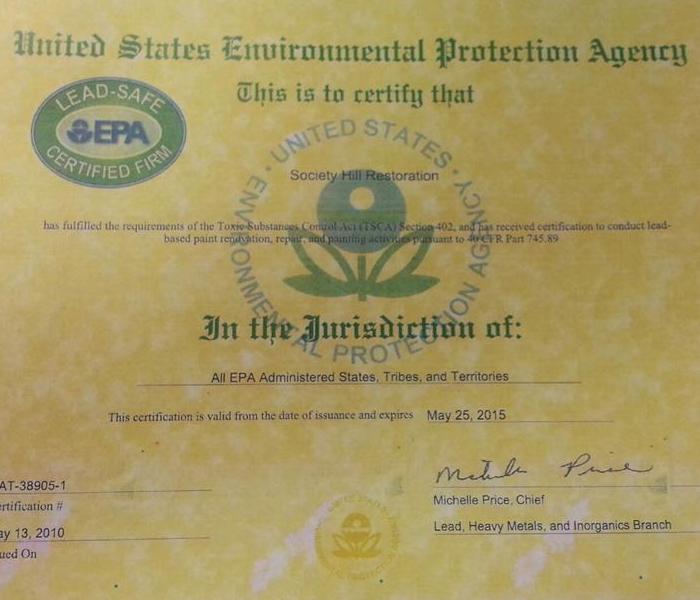Lead Hazard Information
11/6/2013 (Permalink)
In the past few weeks, I have had several people ask me about lead and lead poisoning. So I thought it might be a good topic for our November blog. You, too, can find this information on the U.S. Environmental Protection Agency's website or on the U.S. Department of Housing and Urban Development website, but I have compiled some of the key facts for you here. I will outline some information regarding lead and your health and how to choose a contractor for your renovations if you are a property owner. Utilize the above links to access additional resources.
What is lead? According to the National Institute of Environmental Health Sciences, lead is a naturally occurring metal found deep within the ground. It occurs in small amounts in ore, along with other elements such as silver, zinc or copper. Even though it's found in small amounts, there is an abundant supply of lead throughout the earth. Because it is widespread, easy to extract and easy to work with, lead has been used in a wide variety of products including:
Since 1980, federal and state regulatory standards have helped to minimize or eliminate the amount of lead in consumer products and occupational settings.
Why is lead bad for you? In children, lead can affect developing nervous systems and mental functions, causing learning disabilities and behavior problems. Low levels of lead can also be harmful to adults, causing high blood pressure and hypertension. Lead gets into the body when it is swallowed or inhaled. The most common way to get lead in the body is from dust from lead-based paint or lead-contaminated soil. When lead-based paint is disturbed through sanding, for example, people can breathe in lead dust or fumes. Lead can also come from outside soil, your water, or household items. A blood test is the only way to find out if you or a family member already has lead poisoning. Call your doctor or local health department to arrange for a blood test. (For more information, call 1-800-424-LEAD.)
What are some of the things you can do to protect your family everyday?
? Regularly clean floors, window sills, and other surfaces.
? Wash children's hands, bottles, pacifiers, and toys often.
? Make sure children eat a healthy, nutritious diet consistent with the USDA's dietary guidelines, that helps protect children from the effects of lead.
? Wipe off shoes before entering the house.
How do you know if your home has lead-based paint? 87% of homes built before 1940 are likely to contain lead. In fact, if your home or your child's school was built before 1978, there is a risk of lead-based paint. You or your contractor may test for lead using an EPA-approved lead test kit. You can also hire a certified professional to check for lead-based paint. SERVPRO of Burlington/Mt Holly is an EPA lead-safe certified firm. As of April 2010, federal law requires that contractors performing renovation, repair and painting projects that disturb lead-based paint in homes, child care facilities, and schools built before 1978 be certified and follow specific work practices to prevent lead contamination. Our SERVPRO franchises, Burlington/Mt Holly and Society Hill, Philadelphia, became certified as of May 2010. If you are not using us for your home repairs, make sure your contractor is EPA certified. You have a right to see a copy of their training certificate, and you can ask for and call references. Always make sure that the contract is clear about how the work will be set up, performed and cleaned. Don't forget to share the results of any previous lead tests with the contractor.
If you have questions or are concerned about your home, please call us today at 609-326-3663 or 215-772-1203.






 24/7 Emergency Service
24/7 Emergency Service
